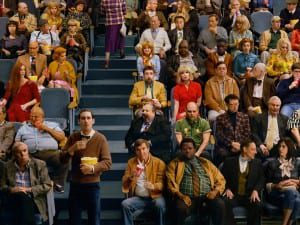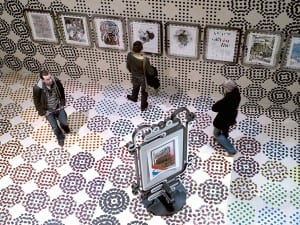The 2013 edition of Britain’s best-loved opera festival, Glyndebourne, opens in style on 18 May with a new production of Richard Strauss’ Ariadne auf Naxos. Directed by Katharina Thoma, and under the baton of Vladimir Jurowski in his final season as Glyndebourne’s Music Director, the production also sees many operatic talents making their Glyndebourne debuts. Mezzo soprano Kate Lindsey, who takes on the role of the Composer, is one such artist, and Aesthetica speaks to her about this exciting new experience and what audiences can expect.
A: 2013 is a busy year for you, with your return to the Metropolitan Opera in La Clemenza di Tito, Los Angeles Opera’s La Cenerentola and your Glyndebourne debut as the Composer in Ariadne auf Naxos. You must be accustomed to this, but how do you approach preparing for such a range of projects in quick succession?
KL: I manage to prepare with plenty of early strategising and a bit of imagination! Truthfully, this season hasn’t been as difficult as others so I have felt quite relaxed about it. The most important thing for me is to be able to find very focused, quiet time in front of the piano where there are no distractions. That, and a lot of reading and research, holds me in good stead and keeps me plenty occupied.
A: With its grounds, setting and great tradition, Glyndebourne is a unique experience valued by many. What, to you, makes it a particularly special place to perform, and how does it feel to be part of the production that opens the Festival this year?
KL: I had my first young artist experiences singing with the Santa Fe Opera and the Opera Theatre of St. Louis. Both of these summer opera festivals were modelled specifically after Glyndebourne. For years I have heard of this opera company in the English countryside where the seemingly impossible dreams of John Christie and Audrey Mildmay grew into one of the most inspiring places to enjoy opera. Now, being here, I have an even deeper regard for the tradition of this company, and its search for cutting-edge artistic excellence. Where else can you take a break from rehearsal and go visit the grazing sheep to find a little more inspiration?
A: For those who may not be all that familiar with Ariadne auf Naxos, can you briefly summarise its story and where you figure in it?
KL: On the one hand Ariadne is a piece about the rivalry and competition between “high” and “low” art. But it’s also a piece about despair and hope. I sing the role of the Composer and The Prologue (Act 1) opens on the most important day of his life; the premiere of his first opera. But in the very last moments before the opera is due to start, the opera’s patron says the piece is too sad and depressing and so demands that it be simultaneously performed alongside a comedic dance troupe, especially during the “boring” parts of the music. This throws the Composer into a tailspin as he tries to save his precious and most sacred piece of music.
But this is Glyndebourne and the production is so much more powerful than I can do justice to. There are major twists, although what they are I couldn’t possibly say.
A: Can you tell us more about the creative vision behind the Glyndebourne production?
KL: I don’t want to give too much of Katharina Thoma’s brilliant concept away, but I’ll say this: the production has been reimagined to take place around 1940 as the threat and pain of war looms large.
A: Comic opera is a large part of your current repertoire; are there aspects of this you particularly lean towards vocally, dramatically or otherwise?
KL: I enjoy anything that allows me to find an element of honesty and truth. Comedy is only truly amusing when the stakes are high, therefore I generally try to avoid focusing on being “funny”. Instead, I hone in on the text and the physical life of the character in order to find the seeds of sincerity, which hopefully grow into a rounded embodiment of a person who can be deeply understood and enjoyed by the audience.
A: One of the great things about being a mezzo soprano seems to be the opportunity it affords for diversity in the roles you take on – a romantic heroine at one turn and a trouser role like the Composer in Ariadne at the next – from this great variety, what do you most enjoy and why?
KL: I must say that it’s a great pleasure to be able to enjoy the diversity of these roles. Even in the worlds of theatre, movies and TV, it’s rare that an actor has the opportunity to play a part that requires them to change gender. However, at the end of the day what I enjoy most in all of these roles is the exploration of humanity — who we are; why we do the things we do; how our backgrounds shape our emotions and decisions — these are the questions and challenges which turn me on and keep my curiosity always intact.
A: Ariadne will be streamed online and broadcast live in cinemas across the country on 4 June. How do you feel about the phenomenon of bringing opera to a wider audience through such means?
KL: I think it’s wonderful. I’ve had the honour of participating in several live HD performances from the Metropolitan Opera, and although it’s rather nerve-wracking on the day of the show, it’s absolutely worth it. Opera is for everyone, and if this means that people will feel encouraged to try opera at the movie theatre, then go for it! There’s also a real intimacy that the camera work can offer, which can sometimes help people who are less familiar with the piece. Still, the one thing that you can’t get in the movie theatre is the true magnificence and purity of sound that comes from the orchestra and singers together, in addition to the shared experience of being in the room together as the performance unfolds. Therefore, if I were an “Opera Doc” I’d prescribe a healthy dose of both experiences for a balanced musical diet.
A: From the rest of the Glyndebourne 2013 programme, what are you most looking forward to seeing?
KL: Everything, everything, everything! There’s no way I could even pick from the five other operas on offer at the Festival. I have a lot of friends in many of the productions, and I really enjoy being able to observe and learn from my colleagues – and witnessing them perform in such a magical place as Glyndebourne promises to be very special indeed.
Glyndebourne Festival begins with Ariadne auf Naxos on 18 May and runs until 25 August To book, and for more information on Glyndebourne’s cinema screenings, visit www.glyndebourne.com.
1. Image courtesy of Sam Stephenson.





